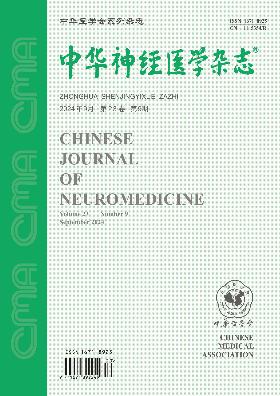Recent advance in association between ring finger protein 213 gene p.R4810K and moyamoya disease
Q4 Medicine
引用次数: 0
Abstract
Moyamoya disease (MMD) is a chronic progressive steno-occlusive vasculopathy that involves terminal portions of the bilateral internal carotid arteries and/or the initial segment of the middle cerebral arteries and/or the initial segment of the anterior cerebral arteries. Ring finger protein 213 gene (RNF213) is considered as the major susceptibility gene of MMD. RNF213 p.R4810K is mainly distributed in East Asians and is the founder variant of Asian patients with MMD. RNF213 p.R4810K is associated with the incidence, prevalence, severity of illness and clinical manifestations of MMD. The biochemical mechanisms of RNF213 p.R4810K are still unclear and may affect angiogenesis of endothelial cells through both cell cycle-dependent and cell cycle-independent mechanisms. This paper reviews the research progress of RNF213 p.R4810K and the related mechanisms in MMD. Key words: Moyamoya disease; Ring finger protein 213 gene p.R4810K; Genetics无名指蛋白213基因p.R4810K与烟雾病相关性研究进展
烟雾病(MMD)是一种慢性进行性狭窄闭塞性血管病变,累及双侧颈内动脉末端和/或大脑中动脉起始段和/或大脑前动脉起始段。环指蛋白213基因(Ring finger protein 213 gene, RNF213)被认为是烟雾病的主要易感基因。RNF213 p.R4810K主要分布于东亚,是亚洲烟雾病患者的始创变异。RNF213 p.R4810K与烟雾病的发病率、患病率、病情严重程度及临床表现相关。RNF213 p.R4810K的生化机制尚不清楚,可能通过细胞周期依赖性和细胞周期非依赖性两种机制影响内皮细胞的血管生成。本文综述了RNF213 p.R4810K基因及其在烟雾病中的作用机制的研究进展。关键词:烟雾病;无名指蛋白213基因p.R4810K;遗传学
本文章由计算机程序翻译,如有差异,请以英文原文为准。
求助全文
约1分钟内获得全文
求助全文
来源期刊

中华神经医学杂志
Psychology-Neuropsychology and Physiological Psychology
CiteScore
0.30
自引率
0.00%
发文量
6272
期刊介绍:
 求助内容:
求助内容: 应助结果提醒方式:
应助结果提醒方式:


